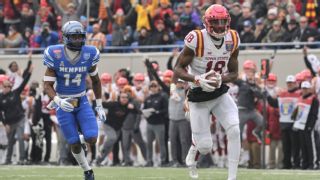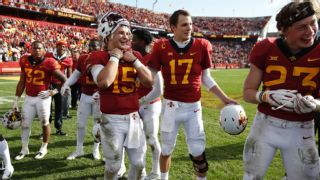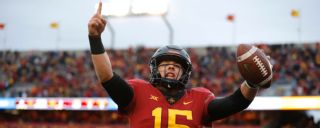|
AMES, Iowa -- Last week after Iowa State won its fifth straight conference game, a feat never before accomplished, coach Matt Campbell doubled down on the rallying call that has pushed the Cyclones into preparation for their most significant game in more than a decade Saturday night at Texas. "I don't know if we're super special in a lot of ways," Campbell said. "I still think our margin for error is really small. What we're really super special in is what goes on in the locker room." He has been saying some version of the same thing for two years. Since Campbell's teachings took hold seemingly overnight late in his first season at the school in November 2016, Iowa State has won 12 of 18 Big 12 games -- 10 more wins than in its previous 23 conference games. The Cyclones, who jumped six spots to No. 16 this week in the CFP rankings, have beaten every league foe over the past two seasons but the aforementioned Longhorns and Kansas State. They have opportunities to cross both off the list over the next 10 days. A win over Texas on Saturday (8 p.m. ET, LHN) would put Iowa State in position to play in the Big 12 championship game if Oklahoma beats West Virginia on Nov. 23. When the Cyclones routed the sixth-ranked Mountaineers a month ago, Campbell celebrated the win with the jubilant Iowa State fan base -- equally enamored with the 38-year-old coach as the success he has brought to Ames -- but he soon stepped right back into stump-speech mode. Iowa State must develop from within. The Cyclones can't rely on their history or reputation. "Our kids have accepted who we are," Campbell said. "They understand what it takes for us to be successful." The little secret, though, is that Iowa State isn't doing this with a roster full of dogs.  Campbell's right that the Cyclones' togetherness and selfless play have fueled the quick rise of his program. But Iowa State possesses the talent to more than compete against the league's best. Led by a game-changing quarterback who turned down Alabama nine months ago, and skill alongside him on offense built for a jump to the NFL, ISU can compete on any stage in the Big 12. "People think Iowa State is a feel-good story," said Lou Ayeni, the Northwestern running backs coach and recruiting coordinator who spent the past four seasons at Iowa State. "Nah, they've got really good players. Don't be mistaken." Ayeni recruited Hakeem Butler, the 6-foot-6 junior wide receiver out of Baltimore via high school in Richmond, Texas who leads the nation in yards per reception at 22.7, and junior running back David Montgomery, a Cincinnati product who earned All-Big 12 recognition a year ago and leads the conference this fall with 476 yards after first contact. If Butler and Montgomery played at Texas and Ohio State, respectively, they'd be in the Heisman conversation, Ayeni said, and both teams would sit in better shape to contend for a national title. "It's just the perception over the years of not having success," Ayeni said. "People think it's the same, old Iowa State. But as soon as Campbell got in there, he flipped that roster pretty fast. And the biggest thing we did, we had [fewer] recruiting misses." It definitely didn't miss on Brock Purdy. Iowa State is 5-0 since he took over at quarterback in the first week of October. Purdy's opponent-adjusted QBR ranks fourth nationally behind Tua Tagovailoa of Alabama, Oklahoma's Kyler Murray and Shea Patterson of Michigan. Only Murray has outpaced Purdy's 10.9 yards per passing attempt. And yes, he rejected the Crimson Tide. It's the single story that might best explain Iowa State's rise over the past three seasons. You see, despite Campbell's rhetoric, according to ISU tight ends coach and recruiting coordinator Alex Golesh, "in recruiting, we certainly don't sell the underdog role." But with Purdy, they actually did. At the close of last year, Campbell needed a quarterback. ISU coaches were unsure at the time if Kyle Kempt, who emerged unexpectedly as a star at midseason in 2017, would receive a rare sixth season of eligibility. So Campbell targeted Purdy, whom the Cyclones identified as the best uncommitted QB prospect nationally. But for all of his prep accolades in Gilbert, Arizona -- the 6-foot-1 Purdy threw for some 4,400 yards and 57 touchdowns as a senior and was named the Gatorade Player of the Year in his home state -- he received scant recruiting attention. Campbell's first phone call to the QB lasted 75 minutes.  "I sensed something special," the coach said. Golesh said Purdy and Campbell made for a "perfect fit," in part because of how they both embraced the role of dark horse. Then as Purdy planned a trip to Iowa State in January, Alabama became interested. Others, including Texas A&M with new coach Jimbo Fisher, offered. As for Nick Saban, he wanted Purdy as a backup to the backup plan, what with Jalen Hurts' return uncertain after Tagovailoa's breakout performance in the CFP title game. Alabama missed on Brevin White, who went to Princeton, East Carolina transfer Gardner Minshew, who landed at Washington State, and Purdy -- ultimately pulling Layne Hatcher away from an Arkansas State commitment to fill the same role. So instead of sitting behind the Heisman Trophy favorite this fall, Purdy has surged off the bench at Iowa State to toss a school freshman-record 13 touchdowns and complete 68.6 percent of his throws for 1,315 yards. Against Baylor on Saturday in a 28-14 win, the Arizona kid shined in the 25-degree weather. He threw for 230 yards and rushed for 56. "I thought he was incredible," Campbell said. In nearly the same breath, Campbell credits Kempt, who got his sixth year last February and entered this fall as the starter. Kempt suffered a knee injury in the Cyclones' season-opening loss at Iowa and has returned only to lead a fourth-quarter drive two weeks ago in a 27-3 ISU win at Kansas. Kempt, a team captain, mentored Purdy in practice, though. And after the Cyclones lost 17-14 at TCU on Sept. 29 in Zeb Noland's third start, Kempt told Campbell that he believed Purdy was ready to take over. Campbell took the advice to heart. "I do when it's a guy like Kyle Kempt," the coach said. Noland started on Oct. 6 at Oklahoma State but played only one series. In his collegiate debut, Purdy led the Cyclones to a 48-42 win. He threw for 318 yards and rushed for 84, accounting for five touchdowns. Noland, a sophomore, left the team and plans to transfer. Purdy has only improved his play over the past month. "You can barely tell he's a freshman," receiver Deshaunte Jones said. "I don't think a lot of things bother him." The Cyclones are banking that a night game in Austin, with Texas also still alive for a spot in the Dec. 1 Big 12 title game, will rate as just another moment for Purdy to conquer. "The only reason that there's a fit," Campbell said, "is because the captain quarterback that's a senior has the humility to say, 'You know what, I'm going to make sure he fits.'" Campbell, in fact, describes Kempt as the Cyclones' most valuable player. Meanwhile, Purdy, as a freshman, per Campbell's policy, does not take questions from media. Both circumstances mesh nicely with the ISU mantra that no individual deserves more recognition than the team. It's a philosophy to be tested again Saturday as Montgomery is set to miss the first half against Texas for his role in a fight during the third quarter last week. Momentarily, as Baylor was flagged for a late hit on the running back and tempers flared in the aftermath, Iowa State faced a situation at home that could have spun out of control. Despite Montgomery's ejection, the Cyclones responded well, converting the eventful possession into a field goal, then answering Baylor's first touchdown with a four-play drive to go up 28-7. "They came after us and we responded," senior linebacker Willie Harvey said. "I feel like the growth of our team really showed." So when was the last game this late in a season with Big 12 title implications for Iowa State? It was 2005, an overtime loss to Kansas in the final week of the regular season. "We're playing real, meaningful football games in November," Golesh said, "which is what we've talked about since we got here. That was the goal. When we're talking to recruits, it's, 'Look, we are relevant. We're no longer on the rise. We are here.'" Bold, for sure. But Campbell is buoyed by another thought. "What's exciting," he said, "is to sit here right now and know that our best is still out there."
|


